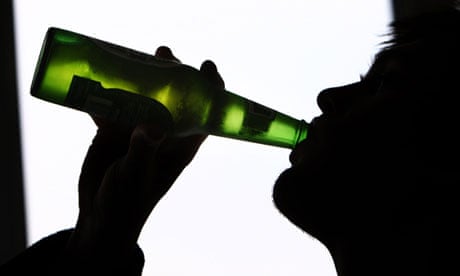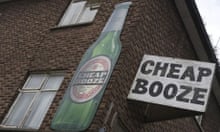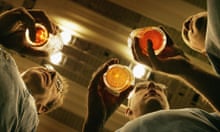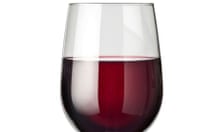Doctors' leaders want tough action to limit the sale and promotion of alcohol, including cigarette-style graphic warnings and an end to drinks firms sponsoring sport, to tackle the growing toll of drink-related problems.
A coalition of medical organisations, including those representing GPs, A&E doctors and surgeons, urges ministers in a new report to implement an array of radical measures to reduce the £55bn annual cost of alcohol misuse.
But the draconian proposals did not find much favour with either the drinks industry or the Department of Health, which immediately said that it did not support the introduction of graphic health warnings on bottles and tins.
The Alcohol Health Alliance claims efforts to educate people about the risks of excess alcohol and voluntary deals with the drinks industry have not reversed the trend of increasingly problematic drinking. It wants ministers to set the planned minimum price for alcohol that David Cameron has decided should be introduced in England to be set at 50p a unit, higher than the coalition's preferred option of 45p.
The alliance of 70 medical bodies and health charities is demanding that:
A third of the label on all cans and bottles of alcohol should be given over to a hard-hitting warning about the health dangers of over-consumption
A ban on all alcohol advertising and sponsorship. That would stop alcohol manufacturers paying millions to have their name on teams' shirts or in the title of a competition – such as Budweiser, which sponsors the FA Cup in England
Drink sales in shops and supermarkets should be restricted to certain times, and alcohol products sold only in designated areas, to reduce "pre-loading" – in which people drink cheaper shop-bought alcohol before going out
A hike in the price of high-strength products, such as certain wines, to discourage consumption
Local councils do more to stop the proliferation of premises selling alcohol in certain areas
The drink-drive limit should fall to 50mg per 100ml of blood – amounting to no more than a single pint of beer
The alliance welcomed what it called the limited progress achieved through the coalition's controversial "responsibility deal" with alcohol producers, such as their pledge to put information about the number of units involved and a warning about not drinking in pregnancy on 80% of products by the end of 2014.
Sir Ian Gilmore, the AHA's chair, said action was especially urgent given that UK teenagers drink much more than the European average.
Sir Richard Thompson, president of the Royal College of Physicians, which represents hospital doctors, said the report, Health First, "demonstrates the clear evidence that the government must push on with its commitment to introduce a minimum unit price for alcohol." A 50p minimum unit price could prevent over 3,000 drink-related deaths a year and 40,000 crimes annually in England, he added.
But the Department of Health said: "Cigarette-style health warnings are not applicable to alcohol. All levels of smoking are bad for your health, but the same cannot be said for alcohol consumption."
The department argues that action is already underway to improve the detection and treatment of alcohol problems. Officials agree that information on labels could help consumers make healthier choices, but the industry's labelling policy is considered to be sufficient.
The British Beer and Pub Association rejected the plan. "Alcohol consumption has fallen by 3% in the past year, and is down 16% since 2004. Drinking among young people is also falling", said a spokesman. "The sale of alcohol in the UK is already among the most heavily regulated in the world."









Comments (…)
Sign in or create your Guardian account to join the discussion